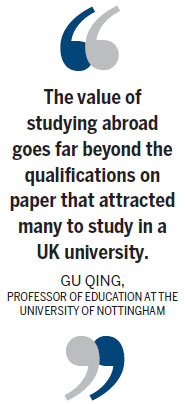Study abroad turbocharges Chinese

Returnees feel more patriotic following international education experience, new research claims
Studying abroad can make Chinese people feel more Chinese when they return home, according to new research from the United Kingdom's University of Nottingham.
Rather than their international experience diluting their own Chinese backgrounds and home culture, 75 percent of returnees surveyed for the 20-month academic study felt their time abroad enhanced their appreciation of their own culture.
| Gu Qing is a professor of education at the University of Nottingham. Provided to China Daily |
Professor Gu Qing, who led the research, says: "The value of studying abroad goes far beyond the qualifications on paper that attracted many to study in a UK university.
"They understand what it means to be Chinese. Our research shows that the vast majority has a better understanding of Chinese culture and values when they come back. They become much more patriotic and their understanding of national identity becomes stronger."
Half of the Nottingham survey's 652 respondents were in their 20s and 76 percent had returned to China in the previous five years, reflecting the surge in Chinese students overseas.
In January, the Higher Education Statistics Authority in the UK said more first-year students from China enrolled at British universities than those from all European Union countries combined. The authority says 58,810 Chinese undergraduates started studying in Britain last year, compared with 57,190 students from the continent. At the postgraduate level there are almost as many Chinese students as there are home students, according to a report in February from the Higher Education Funding Council for England.
Gu, who completed her master's degree and doctorate in the UK, has spent 10 years researching the experiences of Chinese students in the UK, motivated by her own time at British universities.
"There were small, qualitative studies that were unfair, and some of the observations were mainly about the challenges that Chinese students experience - how they are passive and rote learners. I thought it was stereotypical.
"That's when I thought I should look at the issue from a developmental perspective. If we talk about their development, most of the students are motivated to learn and adapt."

Study abroad experiences also brought changes to most respondents' social circles. Since their return to China, 85 percent of those interviewed had developed new friendships with people whose experiences were more closely matched to their own.
The study, which has been accepted for publication by the British Educational Research Journal, also highlights problems that returnees face.
"Although some of them had challenges, the majority managed to find jobs. Sometimes it's a matter of time and sometimes it's a matter of adjusting expectations," Gu says.
The study adds: "Close to half (44 percent) of the survey respondents felt that their colleagues treated them differently, especially among those in their 20s. However, most of the interviewed returnees told us that they were happy to speak their minds despite resistance and occasional bemusement from colleagues."
China sends more students abroad than any other country.
In 2013 there were 274,439 Chinese students enrolled in higher education programs in the United States, 92,248 in Australia and 70,805 in the UK. Canada, France and Germany are also popular destinations.
Chinese students, in addition to becoming a significant component of higher education overseas, also have an impact on a country's finances, with those enrolled at US colleges and universities contributing $8.04 billion (7.48 billion euros) to the economy in 2013, according to the Institute of International Education in New York.
Despite the costs associated with overseas education, studying abroad continues to appeal to the Chinese.
Between March 21 and March 29, more than 45,000 people attended the largest international education event in China, the China International Education Exhibition Tour, which was held in several cities. There were about 28,000 visitors at the Beijing event.
Last year, say organizers, 473 institutions and higher education service providers took part in the Beijing leg of the tour. While this year's total was not yet available, CIEET says 363 were returning exhibitors.
Gu, who is from the eastern province of Anhui, said: "With the number of people who are coming back, they are building a critical mass in terms of the workforce and linking to the outside world. Their influence cannot be underestimated."
Professor Michele Schweisfurth, from the University of Glasgow, and Li Fengliang, from Beijing's Tsinghua University, collaborated with Gu on the research, which involved participants aged between 20 and 66 years old, who had returned to China at different time points, from less than six months to 27 years ago.
riazat@chinadaily.com.cn
(China Daily European Weekly 04/03/2015 page26)
Today's Top News
- Japan tempting fate if it interferes in the situation of Taiwan Strait
- Stable trade ties benefit China, US
- Experts advocate increasing scope of BRI to include soft power sectors
- New engine powers cargo drone expansion
- China to boost green industry cooperation
- Manufacturing PMI rises in November































